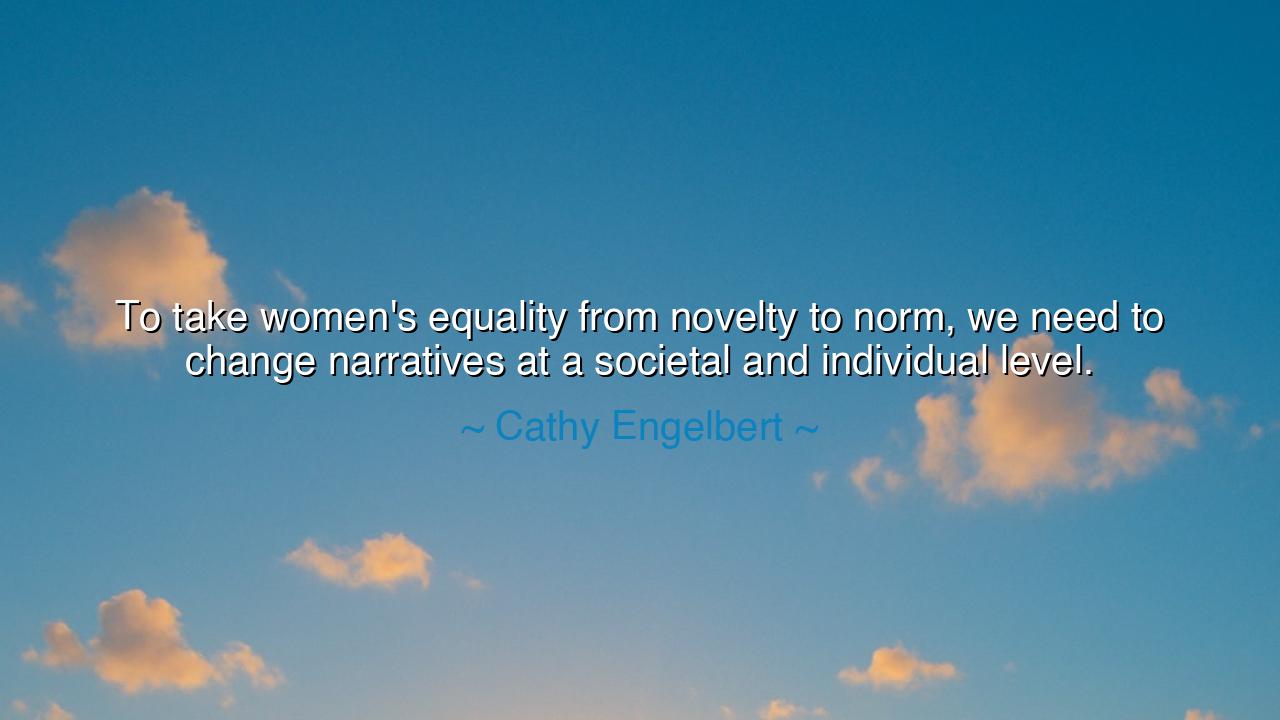
To take women's equality from novelty to norm, we need to change
To take women's equality from novelty to norm, we need to change narratives at a societal and individual level.






In the wisdom-filled voice of Cathy Engelbert, a leader whose vision extends beyond boardrooms into the soul of progress, there resounds a truth worthy of the ancients: “To take women's equality from novelty to norm, we need to change narratives at a societal and individual level.” These words are not merely a call for reform—they are a summons to awakening, a reminder that transformation does not arise from law alone, but from the stories we tell, the beliefs we hold, and the patterns we dare to break. Her statement is both a prophecy and a blueprint for a just future—a future in which the equality of women is not celebrated as an exception, but lived as an expectation.
The meaning of this quote rests upon the recognition that progress begins first in the mind. Society often celebrates women’s achievements as though they were miracles—rare, astonishing, and extraordinary. But Engelbert warns that this is both the glory and the curse of novelty. For as long as women’s equality is seen as something remarkable, it is not yet normal. To make equality the natural state of the world, we must rewrite the narrative that has, for centuries, cast women as secondary, fragile, or limited. Narratives shape thought, thought shapes action, and action shapes destiny. Thus, the revolution of equality begins not in power, but in perception.
In the days of old, societies were guided by myths—stories that told people who they were and what they could become. The myth of male superiority, born from fear and ignorance, has haunted humanity like a shadow stretching across generations. Engelbert’s call is to replace that shadow with light—to reimagine the myth of woman not as helper or muse, but as creator, leader, and equal bearer of the world’s burdens and glories. To change the narrative is to change the world, for what people believe about women becomes what they expect, and what they expect becomes what they allow.
Consider, then, the story of Malala Yousafzai, a young girl who defied the forces that sought to silence her education. In her land, girls’ learning was treated as novelty, an indulgence granted at whim. But when Malala stood before the world and declared that “one child, one teacher, one book, and one pen can change the world,” she altered not only her own fate, but the narrative of millions. Her courage became a new myth, one that turned fragility into fire. Today, her name stands as proof that when the story changes, the system must follow.
Engelbert’s wisdom also speaks to the individual level, for societal change begins with personal conviction. Every person, man or woman, carries within them a story about what is possible. Some inherit the tale that says, “This is how it has always been.” But those who reshape destiny are those who dare to ask, “Why not otherwise?” To honor equality, one must practice it daily—in homes, in workplaces, in words and in silence. It is not enough to wait for institutions to evolve; each person must become a living storyteller of justice, weaving new patterns in the tapestry of culture.
There is power in how we speak. When a woman’s success is described as “inspiring,” yet a man’s as “expected,” the narrative remains unequal. When a girl is taught that leadership is her birthright as much as anyone’s, she grows into a woman who no longer needs to seek permission to exist fully. Engelbert’s words teach us that equality is not granted—it is cultivated, like a field tended by generations. It requires vigilance, for the old weeds of bias grow back swiftly if not rooted out by reflection and renewal.
Therefore, O seeker of wisdom, take this lesson to heart: to make equality the norm, one must speak, act, and believe as though it already is. Begin by questioning the stories that confine you. Rewrite them. Teach your children that greatness has no gender. Celebrate women not for defying expectations, but for fulfilling their rightful potential. And if ever the world treats equality as novelty, remind it gently that this novelty is ancient truth—long awaited, long deserved.
So let the new narrative rise: that the world is not divided into stronger and weaker, but into those who fear change and those who embody it. Walk, then, as one of the latter. Speak not of permission, but of purpose. For when society and the soul both tell the story of equality, the age of novelty will end, and the age of justice will begin. And in that dawn, as Engelbert foresees, woman and man shall stand not apart, but as one voice, one vision, one shared destiny.






AAdministratorAdministrator
Welcome, honored guests. Please leave a comment, we will respond soon